The Pogues often gave the impression that they somehow managed to pull together a career out of chaos and disorder. As it transpires, Pete “Spider” Stacy thinks the band were more thoughtful in their approach than it may have otherwise appeared. “Every step we took seemed to be a logical continuation of the journey,” he says, as he looks back at the band’s discography.
Originally the band’s tin-whistle player, Stacy co-founded the Pogues with Shane MacGowan, Jem Finer and James Fearnley in North London in 1982, going on to become their reluctant frontman after MacGowan left in 1991. By then, The Pogues had recorded five studio albums and one outstanding EP. Two more albums followed before they broke up in 1996.
After reforming with MacGowan in 2001, the band focused on live performances until MacGowan’s death in 2023. But The Pogues live on. In May 2024, Stacy, Finer and Fearnley performed under their old name at Hackney Empire, to mark the 40th anniversary of their debut album, Red Roses For Me, where they were joined by a slew of guests who included members of younger bands inspired and liberated by The Pogues’ approach to traditional music.
Earlier this UK, they toured in celebration of another landmark anniversary – this time for Rum, Sodomy & The Lash. “I struggle to call us ‘The Pogues’,” admits Finer. “It doesn’t feel right without Shane. The posters for the next tour are worded as ‘a celebration of The Pogues’ but the words ‘The Pogues’ are in rather large letters. But we aren’t a tribute band. Spider, James and I are very particular that we want to expand on the sound and add instruments, so it has the original power and feel but with a ceilidh sound.”
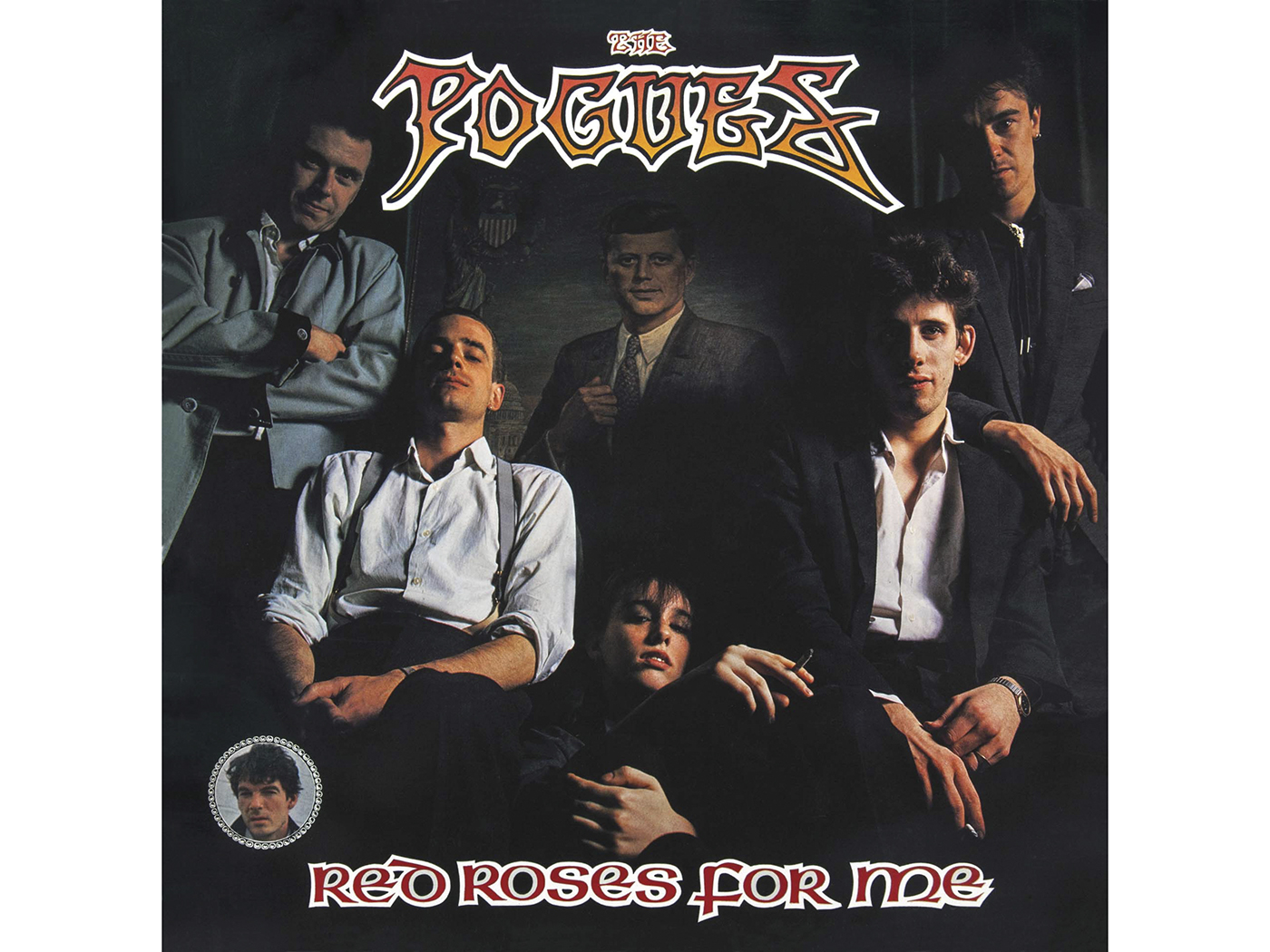
RED ROSES FOR ME
STIFF, 1984
World-building mix of traditional songs and originals that doesn’t quite capture their live power
JAMES FEARNLEY, ACCORDION: We practised really hard. Jem was herding everybody in a room and making us go over the songs. Then we went to the studio in Wapping to make them real. Our producer Stan Brennan tried to discourage us from attending the mixes, but I am a busybody and felt one of us had to show up. He put reverse echo on our very first song, so that’s the first thing you hear of The Pogues – Shane’s voice saying the first syllable of the first line in reverse. It’s a bit of an anticlimax but it is also quite charming.
JEM FINER, BANJO: It was a learning experience, and I generally like learning. Hearing the record, I thought we had amazing songs and a very unique sensibility – we were so idiosyncratic – but I was never happy with how it sounded. Shane was very much the leader. He picked the traditional material and was writing original songs, drawing on his love of that music. Nothing would have happened without him.
SPIDER STACY, TIN WHISTLE: The most exciting thing was getting a finished copy and taking it to a friend to see what he thought. I was surprised to the extent of their enthusiasm because up until then we’d only really played to our own crowd. I was in two minds: on the one hand, I thought nobody would like it, but on the other, I wondered why nobody had done this before, because it sounded brilliant. We had this feeling we were onto something.
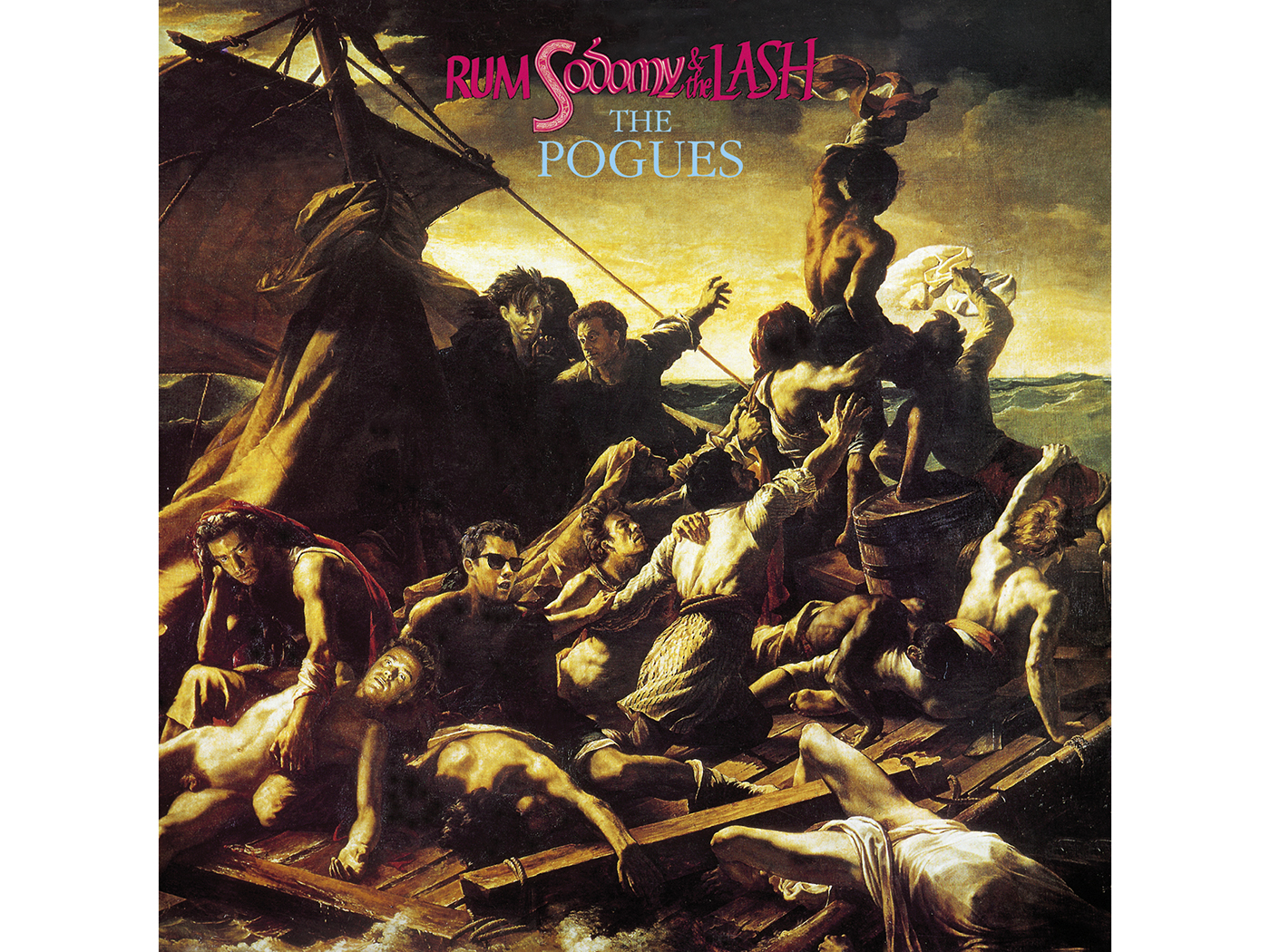
RUM SODOMY & THE LASH
STIFF, 1985
Glorious second album recorded with Elvis Costello
FINER: Elvis came to see us play. I asked our manager to see if he was interested in recording with us. It was the same studio but a different ball game. We never intended to be constricted to the world of that first album, we had an openness to the music we heard around us and that gradually emerged. This was a tangible progression. Shane’s writing was getting stronger and it had a better sound and richer arrangements.
FEARNLEY: I remember Elvis being at the studio with his pork pie hat and glasses, peeling a pomelo. He and Cait [O’Riordan] were an item, living in Holland Park. They clearly went to a posh grocer to get
a pomelo, so he had a piece of fruit that rhymed with his name. I was a bit jittery as I loved Costello’s work. He did a great job of capturing Shane’s voice over and above everything else. It’s great to hear it so well recorded.
STACY: Elvis was more involved than Stan had been. He had much more experience and a better understanding of the possibilities. Writing varied from song to song. Sometimes Shane brought us something fully formed but as time went on, songs had to be coaxed out by Jem and James. In the earlier days he was on fire and the songs were tumbling out of him. Originally, all the traditional songs came from Shane. But over time we all began to introduce ideas.
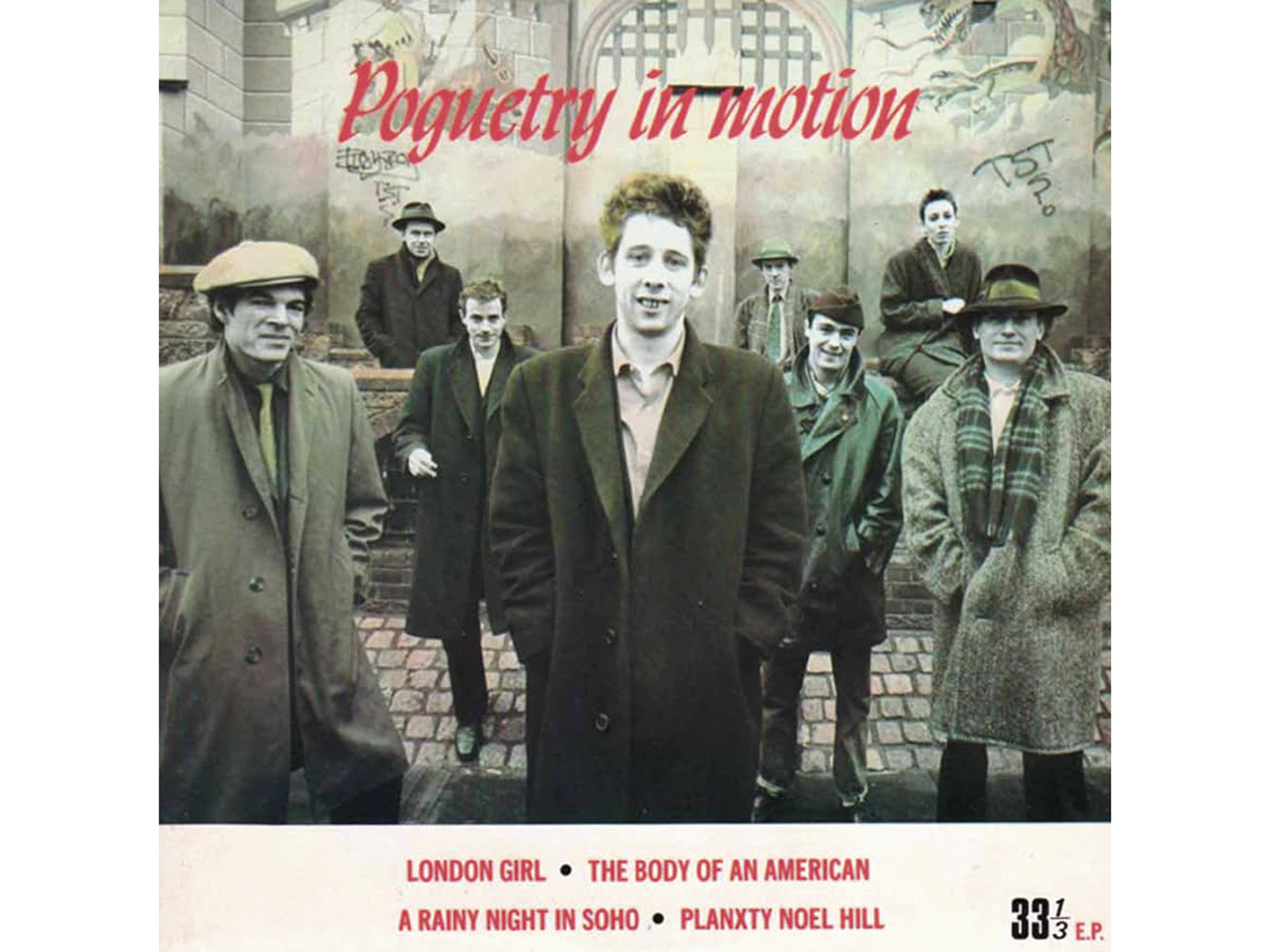
“POGUETRY IN MOTION” EP
STIFF, 1986
Elvis returns for this classic EP which includes “A Rainy Night In Soho”
STACY: I don’t remember why the EP happened but “Rainy Night In Soho” is a magnificent song and “The Body Of An American” is brilliant. “London Girl” might have been a very late Nips [MacGowan’s first band] song that Shane decided to revive. It’s a very pleasing artefact. We also demoed “Fairytale Of New York”.
FINER: It’s a strange thing; I can’t remember why we made it. It might have been the beginning of an album, it might have been a Christmas record. “Rainy Night…” was mindblowing, it didn’t feel like anything we had done before. Shane didn’t make demos, so generally he would come to a session with an idea. As we began to write together, I’d come up with songs for him to write lyrics to. We would sit down and share ideas then go away and see how they developed.
FEARNLEY: Our manager wanted a calling card of some kind for the United States, but I don’t know why an EP was more palatable. It’s stunning how good that record is. “Body Of An American” is an incredible story, then you have “Rainy Night…”, Jesus Christ, and “London Girl”, which is brilliant. It’s a beautiful set of songs. We even did a version of “Fairytale…” with Elvis on piano and very different lyrics. I can’t wait to play “Planxty Noel Hill” because it has a false ending – I don’t remember ever playing that live before.
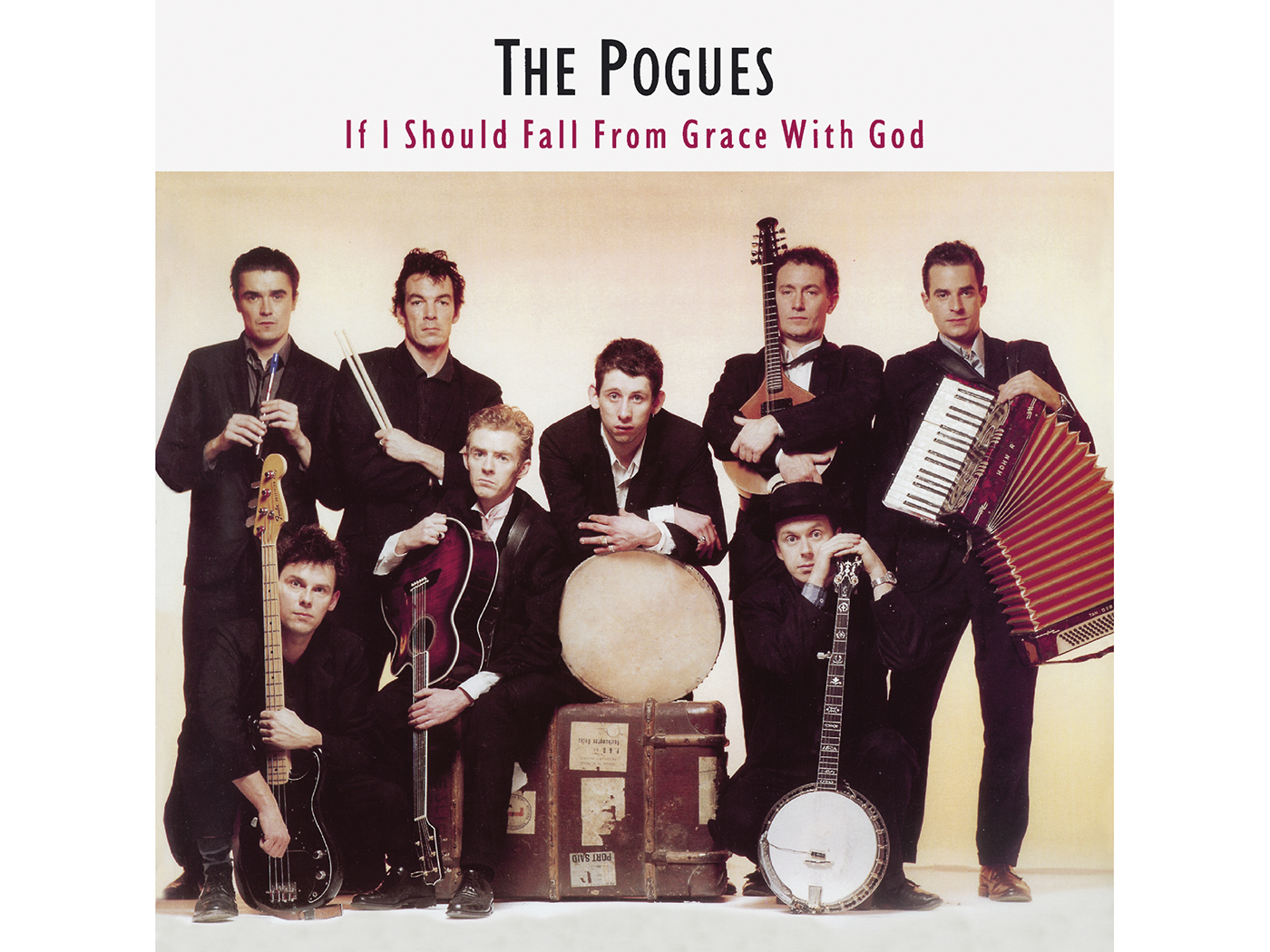
IF I SHOULD FALL FROM GRACE WITH GOD
WARNER, 1988
New members, a different label and Steve Lillywhite conspire to hit new creative heights
STEVE LILLYWHITE, PRODUCER: Jem was the only member of the Pogues that Shane would listen to, mainly because he was the only one who didn’t do any drugs. I was king of the pile when we went in together and pretty empathic to their music. The thing I was most worried about was the fact there were so many in the band, I wouldn’t remember their names. The other problem was that I’d never recorded a whistle before. I began mixing and all I could hear was Spider’s whistle, so I kept turning it down. I called the band back from the pub and played them the mix. They said it was really good, but where was Spider’s whistle? I love that record, it’s very varied.
FINER: This was a really good balance between what we were known for and more unusual influences. It was the perfect moment with everything in the right place. Steve was a classic studio engineer and we were in a beautiful studio in RAK. We knew “Fairytale…” was good but the world is full of brilliant songs that people haven’t heard and rubbish songs that everybody knows, especially Christmas ones. But it doesn’t surprise me that a lot of Pogues music is so popular, because it was always based on something timeless and we made records that had the natural sound of the instrument unadorned by effects.
STACY: I vary between the first three albums as to which is my favourite, but my favourite song is certainly on Fall From Grace – “The Broad Majestic Shannon”. It captures a sense of yearning for a home you will never see again. It’s a beautiful song about memory and love. At Shane’s funeral, when I saw Shane’s sister, it made me realise that it might be about her, which is really beautiful.
FEARNLEY: We needed Steve to tell us how to put “Fairytale…” together. He never saw a problem he couldn’t solve – the bread always lands butter side up for him. It’s a great set of songs, brilliantly sequenced. I look at the different songs and stories now and always find new things that interest me. For “Fairytale…”, I did my utmost to be in sync with Shane and recording that song was one of the highlights of my life.
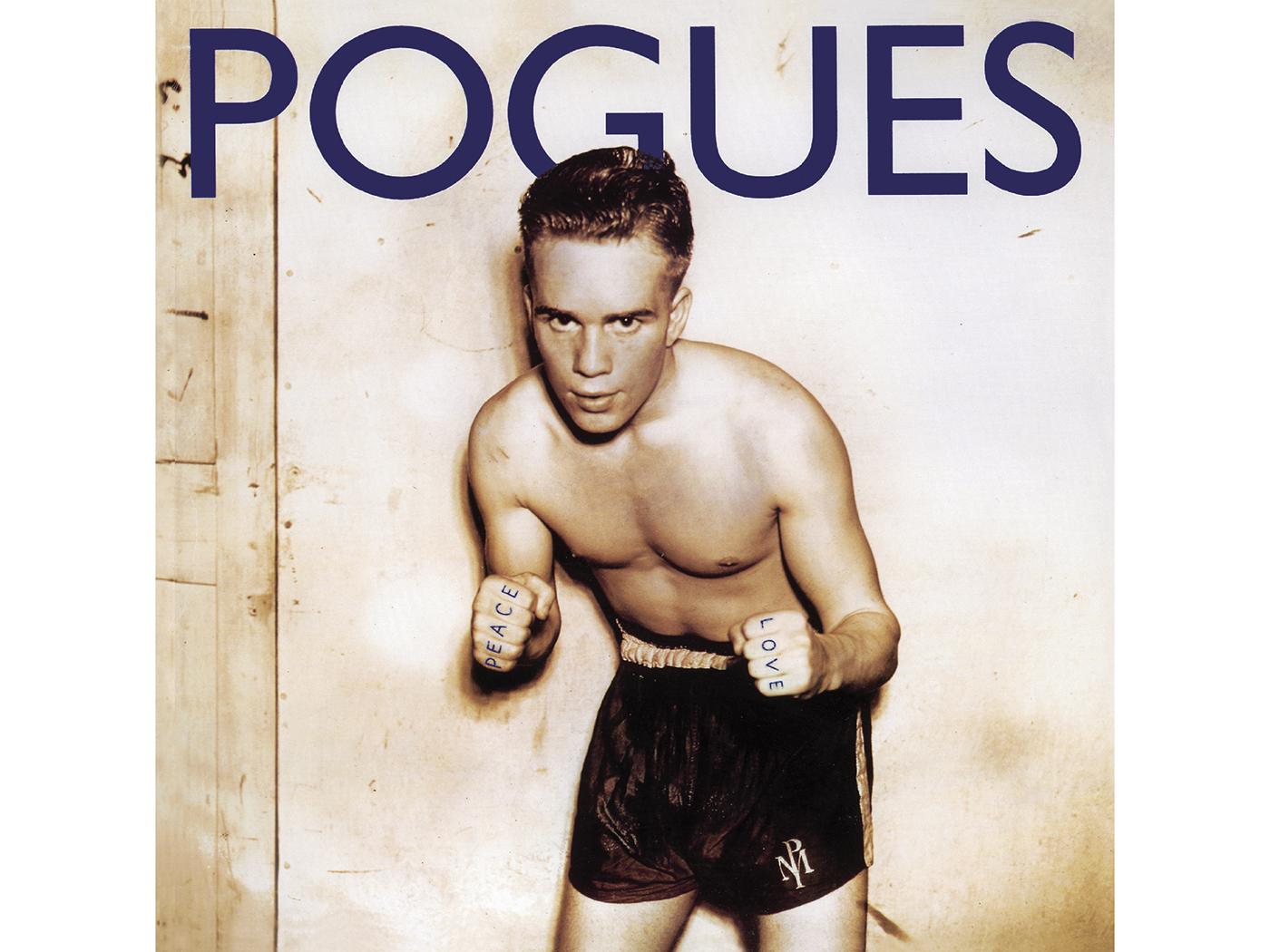
PEACE AND LOVE
WARNER, 1989
The band’s first setback, as MacGowan’s focus slips and Lillywhite struggles to hold things together
FINER: It was problematic. There was a lot of over-indulgence, so objectivity went out the window and a lot of time was spent on too many guitar overdubs. Shane was in a really bad state. I had been writing songs and I gave them to Shane for the lyrics, but he now came to a point where he’d stick with my lyrics. I was happy with “Misty Morning, Albert Bridge” but some of the songs would have been better if he’d been more inclined to contribute. As Shane wasn’t there, we’d experiment with different ideas and instruments. If something didn’t quite work we’d throw more things at it. It was a classic example of a band getting too pleased with itself.
STACY: I can’t point too many fingers because I was on a difficult path myself, but Shane was losing interest. A song like “London You’re A Lady” is a good example – potentially a great song but it’s like a draft. We had killed ourselves touring, 250 shows in a calendar year, never home. It pulls you apart and nobody had a notion of wellness, you just drove yourself into the ground.
FEARNLEY: Things were getting difficult for Shane and I was into self-protection as the dynamics of the group changed. I played my part and kept out of the way. On Peace And Love, everybody was bringing in songs, so we had lots of different influences. “London You’re A Lady” was typical – it sounded amazing but the lyrics didn’t cut it – it could have been towering, but we missed the mark.
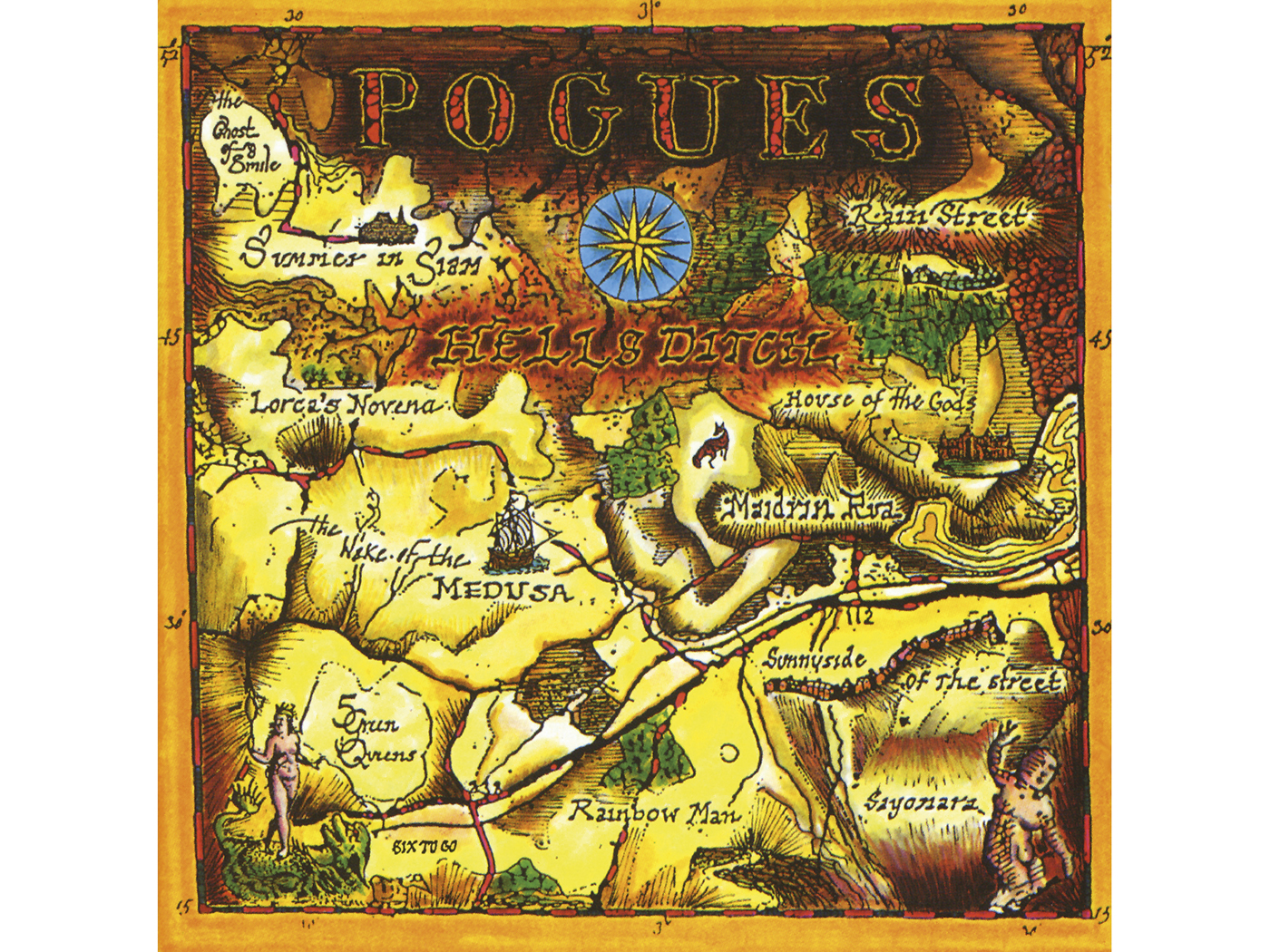
HELL’S DITCH
WARNER, 1990
A return to form as Joe Strummer comes in as producer and takes the band to Rockfield
FINER: Joe was a good friend of the band and had a different approach. It was a much better experience. I stopped giving Shane complete songs so he had to write his own lyrics. One example is “Sunny Side Of The Street”, where I had the music and one line and left him to write a song I’d never have been able to write. We were in better shape and we all got on with Joe.
FEARNLEY: Shane showed up to do his singing, but a lot of the session was the rest of us having a great time hanging out in the Welsh countryside watching the World Cup from Italy. I remember dragging a Hammond B3 through the farmyard and coming across Jem, who was wandering around recording himself hitting different bits of metal. Joe was patient and a good mate and worked hard to ensure we got things on tape as Shane’s diction had gone to shit. Joe loved Shane.
STACY: I think we opened Joe’s eye to a slew of possibilities that he never got to properly explore himself. Shane had a second wind and we had some very good songs. The title track is brilliant. On the day of Shane’s funeral we were in Nenagh and the town was doing Shane proud, it was like a state funeral. I remember walking down the street and this hardware store had mounted a speaker on a telegraph pole and was blasting out “Hell’s Ditch” as the town laid its favourite son to rest.
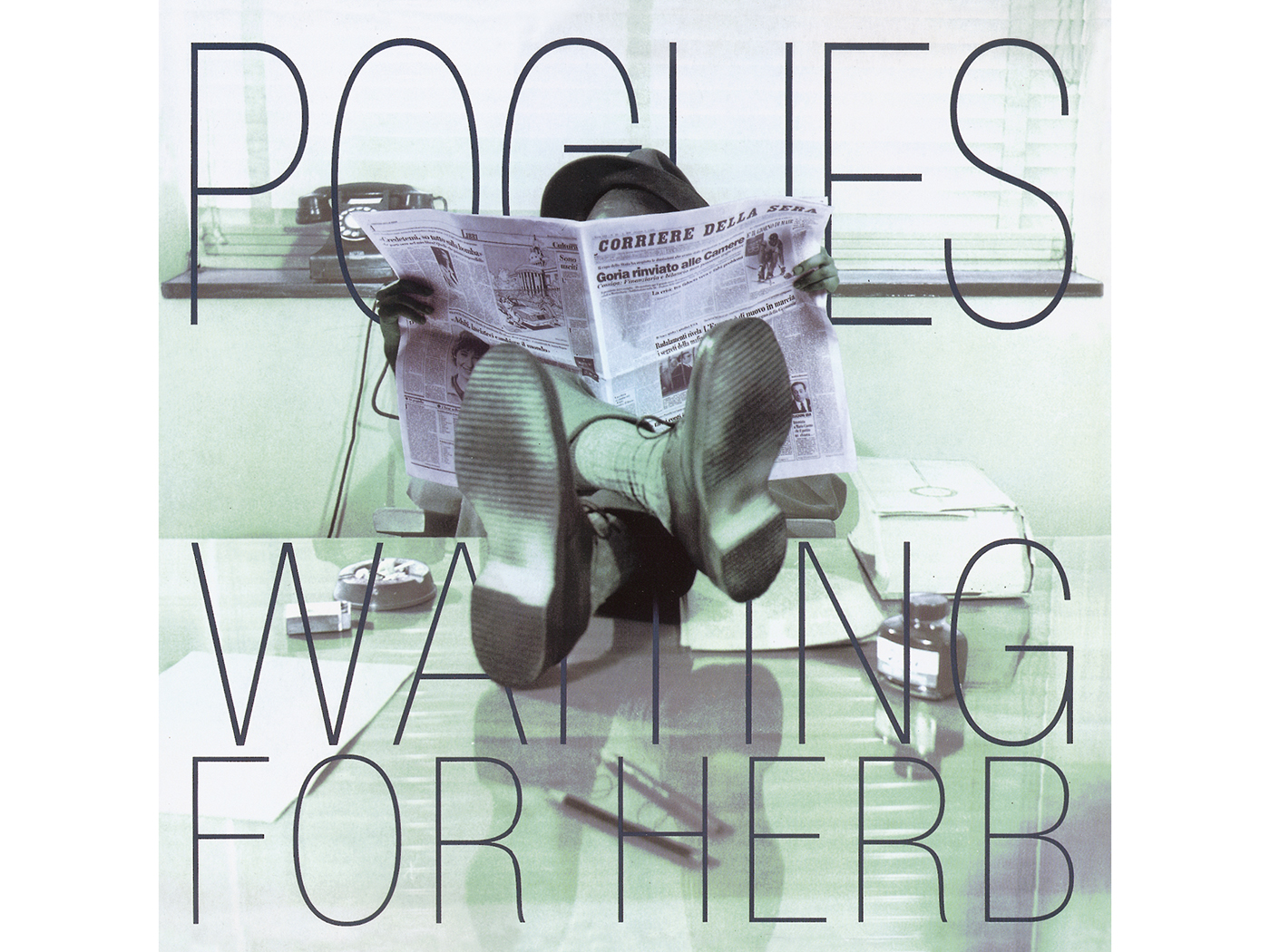
WAITING FOR HERB
WARNER, 1993
Without Shane MacGowan, Spider takes over lead vocals while the pressure mounts on Jem for songwriting
STACY: Things had reached a head. It was apparent Shane wasn’t interested any more, so we put that to him and his response was basically: “What took you so long?” But I think we made the wrong decision. We should have taken time off, but that wasn’t how things were done then. We all suffered as a result. For a while we had Joe as lead singer and that gave us the impetus to keep going. I’d been Shane’s stand-in on a few occasions, so I got the job.
FINER: We had to keep going otherwise we would have been in a very bad financial situation. We looked for a producer and thought about John Leckie. I wanted to work with Brian Eno, but he declined. I wrote him a letter saying we weren’t a bunch of diddly-eyed Irishmen, and he wrote a very nice one back to explain his thinking. There were some good songs on the record. Without Shane it would have been pointless to do what we usually did, so it was the Pogues with a different angle, but we were on a hiding to nothing even though “Tuesday Morning” was a minor hit.
FEARNLEY: It was scary without Shane. I wrote one song, “The Drunken Boat”, which was such a thrill. It was about a toxic tanker that was going round the ocean and nobody would let it dock. I used this as a metaphor for everything I had been through with The Pogues.
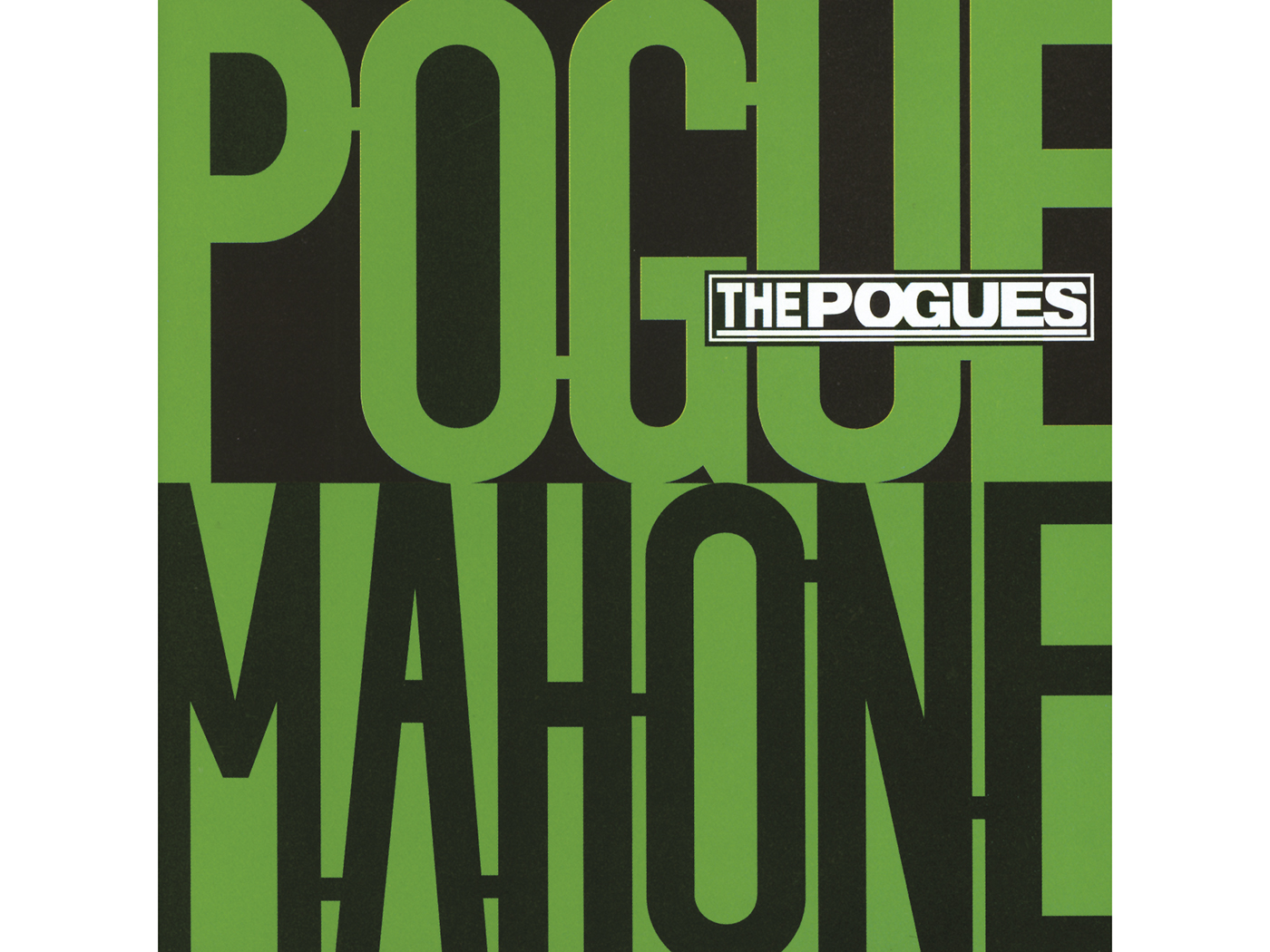
POGUE MAHONE
WARNER, 1996
Fearnley quits before the final studio album, The Pogues having finally run out of steam
FINER: We tried to go back to something we felt was a natural musical progression from Waiting For Herb, but I began to feel it was pointless. There was always a sense it wasn’t really the Pogues without Shane. It would have done better if we had Shane, just as Shane would have been better if the Popes were the Pogues.
STACY: We’d run out of steam. I feel we had lost our identity. We had strayed so far away from what we had been doing. But it wasn’t too long before we reformed. I was sitting at home, I’d stopped drinking and come to terms with the fact the Pogues was over. But then Jem rang saying we’d been offered a Pogues tour and it all started up again. We then carried on for a long time.
FEARNLEY: The original reunion shows with Shane were fantastic but Shane had changed a lot, it was quite alarming. I cried my eyes out as I was so upset to see him like that. But the shows were fantastic.
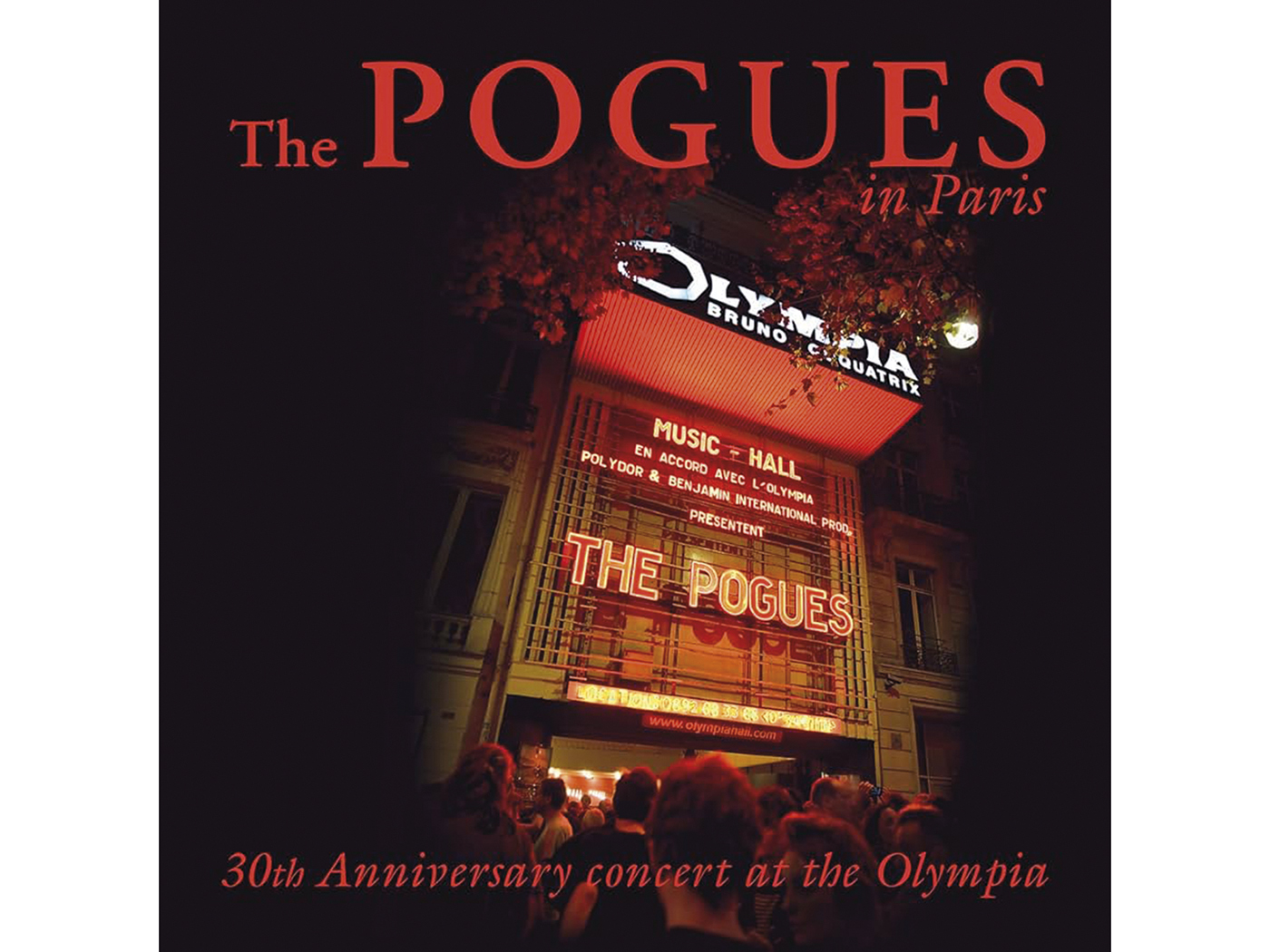
THE POGUES IN PARIS: 30TH ANNIVERSARY CONCERT AT THE OLYMPIA
UNIVERSAL, 2012
With “Fairytale Of New York” now a seasonal standard, The Pogues live show is captured on this anniversary release
FINER: When we split up, it felt like a long time to be in one band, but I seem to still be in it – it’s been 40 years now. We got back in 2001 then toured until 2014, but we didn’t write any new material. We tried but nothing emerged. In the end it was easier playing our old music.
STACY: We released Live In Paris in 2012 and as with a lot of the reunion shows, Shane was not always compos mentis, although his voice was still very powerful. The reunions shows were great, they had a certain chaotic quality and it’s nice to have this documentation of that period. Our shows for the anniversary of Red Roses were fantastic. It began as an evening at the Moth Club and turned into shows at Hackney Empire and in Dublin with people from the Bad Seeds, from Lankum, Fontaines DC and Nadine Shah. These young Irish bands would have happened without The Pogues, but I like to think we have had some influence. It’s a pool of luminous talent that we have been able to recruit from. We’ll take a similar approach for the Rum Sodomy & The Lash shows this year.
FEARNLEY: The shows in Hackney and Dublin made me feel that everything I had gone through and achieved with The Pogues was worth it. It is like the sweets inside the Easter egg, seeing all these other musicians we have influenced, as if MacGowan has spilled out into all these other expressions of himself with all these generations of musicians who think The Pogues were fucking great.
Originally published in Uncut Take 338 (May 2025 issue)
